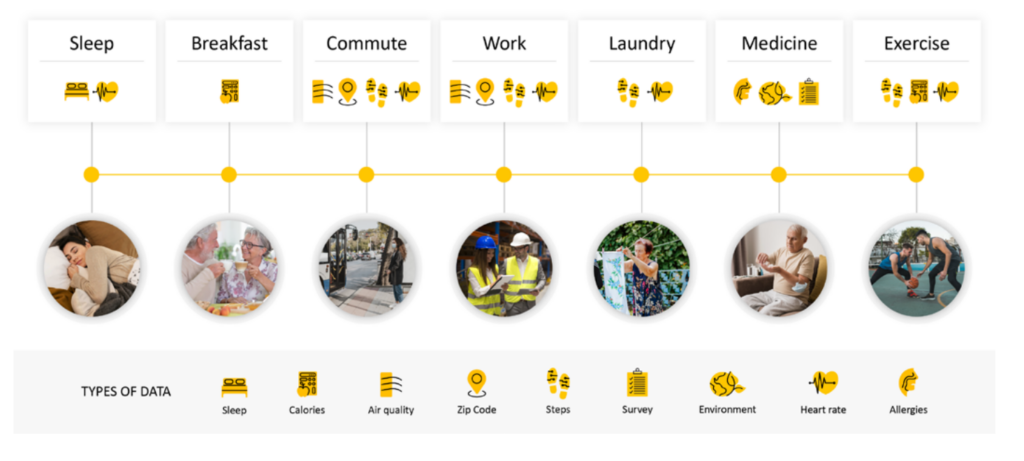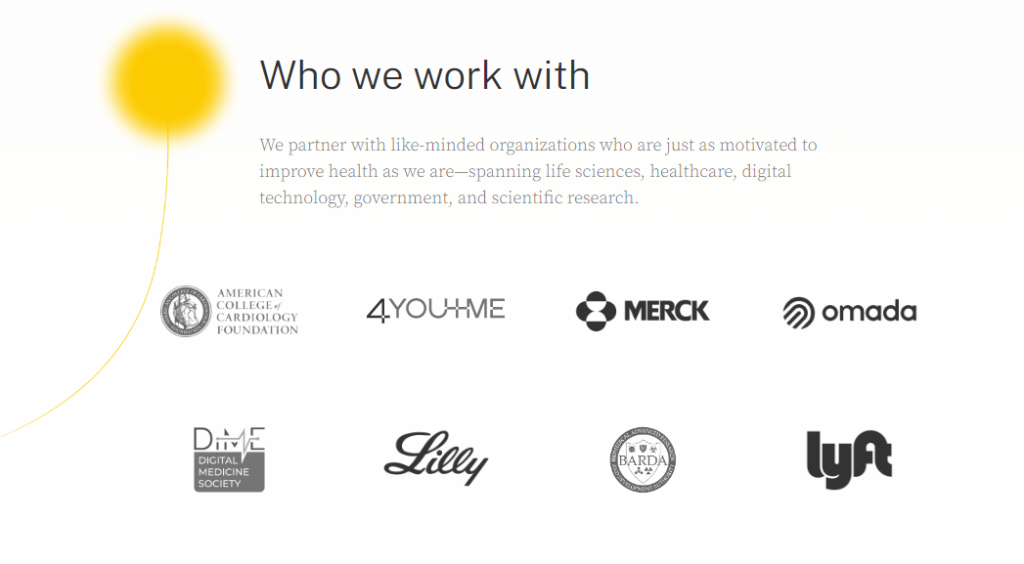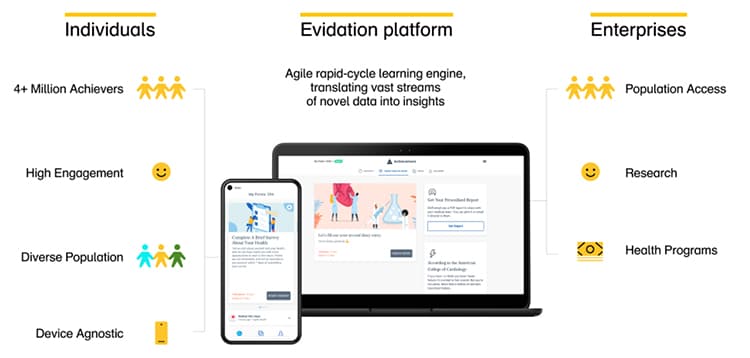Evidation Health: A Platform that Pays You to Track Your Health

Evidation Health is a platform connecting users interested in tracking their health data and research organizations wanting to conduct studies on those same users.
About Evidation Health
Evidation Health, founded in 2012, is a healthtech start-up that has developed a platform that offers health tracking and reward features to its members and connects its members to research institutions. To date, the company has 5M+ users, partnered with 13 of the 15 largest life sciences companies, published 72+ peer-reviewed papers, and raised $259M+.
About The Platform: A Health Tracking Platform for Members & A Research Platform for Healthcare Institutions

About the platform. Evidation Health began because of the rapid adoption of consumer wearables and the rapid generation of person-generated health data (PGHD). Data generated from things like our smart phones, Apple watches, Oura rings, glucose monitors, body weight scales, and calorie-tracking apps has tremendous potential in generating actionable health insights. But for most people, this data is stored separately across dozens of systems – preventing an integrated health view.
For users: an app that integrates your health data and pays you for completing health challenges. Evidation integrates with popular commercial third-party health tracking devices and apps and then displays a seamless snapshot of a person’s health profile. On top of this, Evidation will also pay its users for completing health challenges tied to that data – from completing a walking challenge, answering sponsored research surveys, or engaging with health content. The more time a user spends on the app – the more data is integrated and the more money a user wins – fueling a sticky flywheel.

The research platform: a portal to access highly engaged subjects and comprehensive healthcare data. Because of this community of highly engaged users with extensive commercial-grade data collected daily from wearables and apps, research organizations have been extremely interested in paying Evidation to launch partnered research studies.

For instance, during the COVID pandemic, the US Department of HHS and the Bill Melinda Gates Foundation funded Evidation to conduct a study on an early warning system for COVID-19 and to better understand susceptibility to infection. Evidation used machine learning models on its 5M users to differentiate the earliest signals of COVID-19 from infections. In the on-going study, the models based on data collected from commercial wearables correctly identified more than 50%+ of COVID-19 cases by the third day of symptoms with high specificity.
The Value Creation (& Capture) Story
For Evidation, value creation lies in the value of integrated healthcare data and its community of highly engaged users.
For its 5M+ users, Evidation creates value across three ways: (1) offering a seamless display of integrated health data across a users’ network of third-party devices; (2) delivering health insights and targeted educational content based on the data collected; (3) paying its users for completing health challenges and research surveys or participating in research sprints; and (4) offering users a sense of purpose given that their data can be used to advance research and medicine.
For research organizations, the value lies both in this community and the daily data collected. Very rarely will research studies have such a captive participant group. This means research studies are (1) faster to recruit, (2) less likely to experience high participant drop-off rates mid-study, (3) less costly given the digital nature, and (4) collecting a higher volume of high-fidelity commercial-grade health data alongside key study endpoints. Collectively, this means faster, cheaper, and more comprehensive research studies.

Journey to Scalability & Sustainability
Growth depends on network effects. Critically, Evidation leverages its monetized research partnerships to incentivize user engagement and retention. Interestingly, this means as its community grows more engaged, the more research institutions would pay Evidation to gain access – fueling a growth flywheel.
At the end of the day though, Evidation’s journey will rest on two questions: (1) is Evidation’s health tracking and rewards platform THAT much better than what consumers can get elsewhere?; and (2) is the platform saving enough costs and delivering greater insights to researchers to warrant the access price?



thank you for this post, Patric. Very interesting read. The idea is fascinating, but I do wonder on the quality of data this app collects. I can see it integrates information from other apps such as Strava, Fitbit, AppleHealth and others : how is this point addressed by the big Pharma companies and the health NGOs that Evidation partners with?
Thank you for the interesting post, Patric. Evidation Health seems like a great example of using its connectivity to people and their data streams to run virtual trials that measure the real-world impact at a scale. I personally see great value in Evidation, (without getting into the specific split) running more than a hundred research programs simultaneously with the app. The promise of real-world data is its ability to generate real-world evidence, which is used to help form a more comprehensive understanding of how a medical intervention impacts human health, potentially leading to better outcomes outside the lab.
Thank you for writing about this company, Patric! I’ve often thought about the discrepancy between the amount of wearables and health data that I track and the lack of deliverable, integrated health insights. I’d be interested to know if Evidation is currently profitable (i.e. does it have a constant stream of sponsorships and partnerships to support paying out a growing user base). I’d also be interested in the specific monetary rewards for consumers and if by receiving compensation for their data, consumers are essentially giving up all rights to their own health data. I’d also be concerned about Evidation’s screening of possible sponsorship partners. For example, if an insurance company were to leverage Evidation’s data to screen out less active or sedentary individuals, I wonder if this could lead to future lawsuits for the company. Overall, I think this is an excellent example of a platform providing a much needed service (integrated health insights) in exchange for critical health data that research institutions may leverage.
What a neat concept! A high school age me would have been totally into this (I used to volunteer for medical trials of various sorts at a local hospital). That does lead me to wonder how high quality and consistent the data users are producing is (or perhaps the only productive users are of a biased/specific demographic). I can get why users of an app like Ovia are good about inputting their data, but I wonder if the intrinsic motivation would last as long for a company like this. Like Strava, maybe it’s biggest sticky point is that it integrates other user health data. Thank you for covering!
Thank you for an interesting post! This idea of creating a community around the integrated health data, but I’m really curious to know how is the data quality of integrated data from different sources and if the TAM is big enough of the people who use more than 1 device to get their health information. For Example: if someone using an apple watch will the same user get a fitbit. Additionally, I’m really curious to know the competitive forces that Evidation is facing from big players like apple, as most of the players in this space are have an app to display the data analysis recorded by the respective device.
Hi Patric, this was a very engaging read. I’d be interested in knowing if Evidation has considered integration of other health data as well beyond PGHD. For example, integration with Apple Health to port in data from Epic’s MyChart could serve as a way for patients to monetize their own clinical data as well. I imagine this sort of data could also be worth a lot more for pharma and other players as well since it’s more comprehensive.